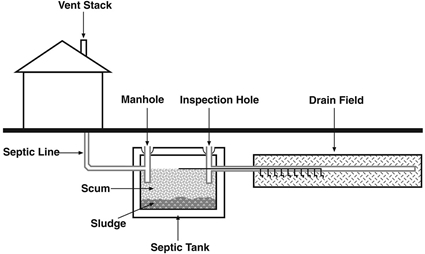

Septic System Information

Your Septic System is your responsibility!
Did you know as a homeowner youíre responsible for maintaining your septic system?
Maintaining your septic system protects your investment in your home. The top four things you can do to protect your septic system are:
- Regularly inspect your system and pump your tank as necessary
- Use water efficiently
- Donít dispose of household hazardous wastes in sinks or toilets
- Care for your drainfield
A typical septic system has four components: a pipe from the home, a septic tank, a drainfield and the soil. Microbes in the soil digest contaminants from wastewater before it reaches the groundwater.
All of your homes wastewater exist your house through a pipe to the septic tank.
The septic tank is a buried watertight container typically made of concrete, fiberglass, or polyethylene. It holds the wastewater long enough to allow solids to settle to the bottom (forming sludge) and oil and grease float to the surface (as scum). It also allows for partial decomposition of the solid materials. A T-shaped outlet in the septic tank prevents the sludge and scum from leaving the tank and traveling into the drainfield area. The wastewater discharged into the drainfield is further treated by the soil.
Newer tanks generally have risers with lids at the ground surface to allow easy location, inspection, and pumping of the tank.
To prevent buildup, sludge and floating scum need to be removed through periodic pumping of the septic tank. Regular inspections and pumping are the best and cheapest way to keep your septic system in good working order.
Saving Money! A key reason to maintain your septic system is to save money! Failing septic systems are expensive to repair or replace, and poor maintenance is often the reason. An average septic system needs to be pumped out every 2-5 years depending on the amount of people in the household, amount of wastewater generated; the volume of solids in the wastewater and septic tank size .
Protecting your Families Health! Another good reason to maintain your septic system is to prevent the spread of infection and disease and protect water resources. Pollutants in household wastewater are nitrogen, phosphorus and disease causing bacteria and viruses. If a septic system is working properly, it will effectively remove most of these pollutants.
How to detect a problem with your septic system
- Check for pooling water or muddy soil around your septic system or in your basement
- Notice if your toilet or sink backs up when you flush or do laundry.
- You might notice bright green strips of grass over the drainfield.
- Also your system can fail by partially treated sewage entering the groundwater causing pollution to wells, streams, and other bodies of water.
